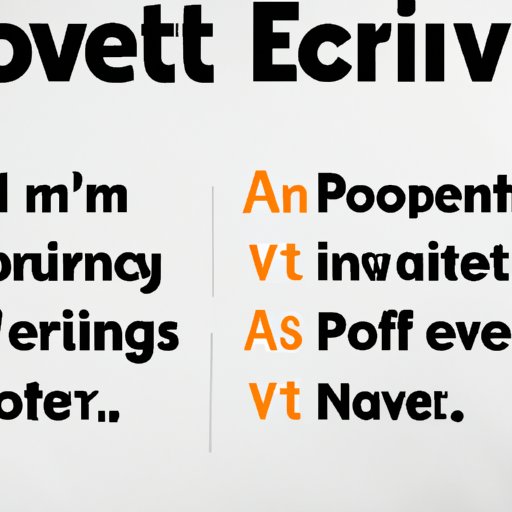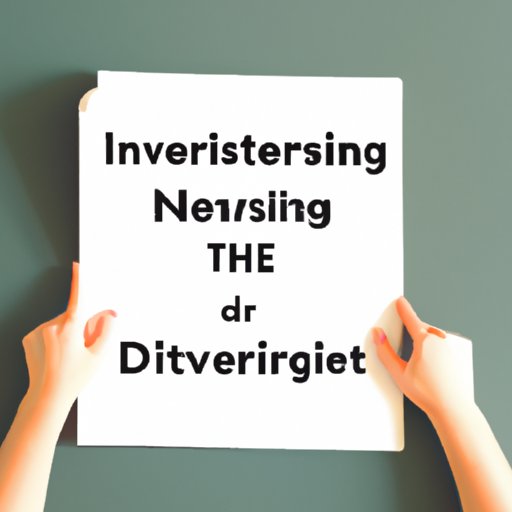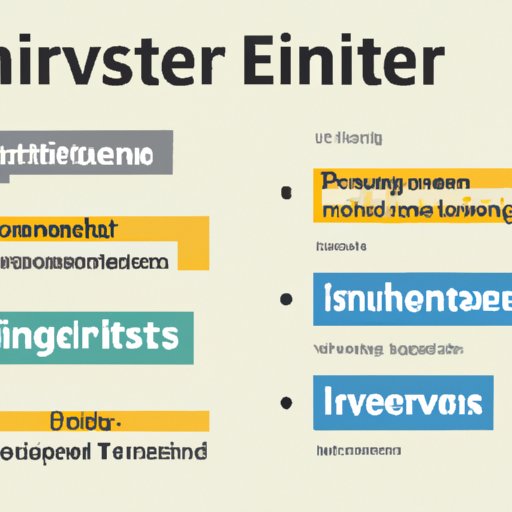Introduction
The terms “introvert” and “extrovert” have become commonplace in our society; however, many people don’t fully understand the nuances of these two personality types. It’s important to understand that there is much more to being an introvert or an extrovert than just whether or not you enjoy being around people. In this article, we will explore the differences between introverts and extroverts, how to identify which one you are, their respective pros and cons, and the benefits of understanding and embracing your personality type.
Exploring the Differences between Introverts and Extroverts
The definitions of introversion and extroversion were first coined by Carl Jung in 1921. According to Jung, introverts gain energy from being alone and prefer to spend time in their own internal world of thoughts, feelings, and ideas. Extroverts, on the other hand, gain energy from being with other people and enjoy being the center of attention in social settings.
So what are some of the other differences between introverts and extroverts? Let’s take a look at some of the common characteristics of each type:
Characteristics of an Introvert
Introverts tend to be more thoughtful and introspective than extroverts. They often enjoy spending time alone, exploring their own thoughts and ideas. They tend to be creative and analytical, and they generally prefer to work independently rather than in groups. They may also be more sensitive to external stimuli such as noise, light, and temperature.
Characteristics of an Extrovert
Extroverts tend to be more outgoing and sociable than introverts. They are often energized by being around other people and enjoy being the center of attention in social settings. They tend to be more action-oriented and less analytical than introverts, and they often prefer to work in teams rather than alone. They may also be less sensitive to external stimuli such as noise, light, and temperature.

How to Identify if You are an Introvert or Extrovert
It can be difficult to know if you are an introvert or an extrovert without taking a formal personality test. However, there are some signs that can help you determine which type you are. Here are five signs that you may be an introvert:
- You prefer spending time alone or with a small group of close friends.
- You often feel drained after spending time in large groups.
- You enjoy deep conversations and analyzing complex topics.
- You prefer to work independently rather than in teams.
- You are more sensitive to external stimuli such as noise, light, and temperature.
Here are five signs that you may be an extrovert:
- You prefer spending time with large groups of people.
- You often feel energized after spending time in large groups.
- You enjoy engaging in small talk and lighthearted conversations.
- You prefer to work in teams rather than alone.
- You are less sensitive to external stimuli such as noise, light, and temperature.

The Pros and Cons of Being an Introvert or Extrovert
While there is no “right” or “wrong” way to be, there are certain advantages and disadvantages to being an introvert or an extrovert. Let’s take a look at some of the pros and cons of each type:
Advantages of Being an Introvert
One of the main advantages of being an introvert is that you are likely to be more thoughtful and analytical than extroverts. This can be beneficial in situations where quick decisions need to be made, as you will be able to take the time to carefully consider all of the available options. Additionally, introverts tend to be better listeners and can often provide valuable insights when presented with a problem. Finally, introverts tend to be more self-aware, which can lead to greater emotional intelligence and empathy.
Disadvantages of Being an Introvert
The downside to being an introvert is that it can be difficult to make connections with people. Introverts tend to be shy and may find it challenging to make small talk in social situations. Additionally, introverts may struggle in environments that require them to be constantly “on” and interacting with others. Finally, introverts may have difficulty speaking up in group settings, which can limit their ability to contribute to discussions.
Advantages of Being an Extrovert
One of the main advantages of being an extrovert is that you are likely to be more outgoing and sociable than introverts. This can be beneficial in situations where networking or collaboration is necessary, as you will be able to easily connect with others and build relationships. Additionally, extroverts tend to be more action-oriented and can quickly come up with solutions to problems. Finally, extroverts may have an easier time speaking up in group settings and expressing their ideas.
Disadvantages of Being an Extrovert
The downside to being an extrovert is that it can be difficult to take the time to think things through. Extroverts tend to be more impulsive and may jump to conclusions before considering all of the available information. Additionally, extroverts may have difficulty focusing on tasks that require extended periods of concentration. Finally, extroverts may have difficulty listening and may not be as aware of their own emotions as introverts.

Developing Your Strengths as an Introvert or Extrovert
Now that you have a better understanding of the differences between introverts and extroverts, it’s time to focus on how to maximize your strengths as either type. Here are some tips for maximizing your strengths as an introvert:
- Focus on developing your listening skills. This will help you to better understand others and provide valuable insights.
- Take the time to think things through before making decisions. This will help you to avoid rash decisions and ensure that you are making the best choice.
- Find ways to express your ideas. This could include writing, painting, or even speaking up in group settings.
- Schedule time for yourself. This will help you to recharge and stay focused on the task at hand.
And here are some tips for maximizing your strengths as an extrovert:
- Focus on developing your communication skills. This will help you to better connect with others and build relationships.
- Take the time to think things through before taking action. This will help you to avoid rash decisions and ensure that you are making the best choice.
- Find ways to express your ideas. This could include speaking up in group settings, joining a debate team, or even starting a blog.
- Schedule time for social activities. This will help you to recharge and stay focused on the task at hand.
Understanding the Benefits of Being an Introvert or Extrovert
It’s important to understand that both introverts and extroverts have unique strengths and weaknesses. By understanding and embracing your personality type, you can use your strengths to your advantage and minimize the impact of your weaknesses. Here are some of the benefits of being an introvert:
- Introverts tend to be more thoughtful and analytical, which can be beneficial in situations where quick decisions need to be made.
- Introverts tend to be better listeners, which can provide valuable insights when presented with a problem.
- Introverts tend to be more self-aware, which can lead to greater emotional intelligence and empathy.
And here are some of the benefits of being an extrovert:
- Extroverts tend to be more outgoing and sociable, which can be beneficial in situations where networking or collaboration is necessary.
- Extroverts tend to be more action-oriented, which can help them to quickly come up with solutions to problems.
- Extroverts tend to be more comfortable speaking up in group settings, which can help them to express their ideas.
Conclusion
In conclusion, it’s important to understand that there is much more to being an introvert or an extrovert than just whether or not you enjoy being around people. By understanding and embracing your personality type, you can use your strengths to your advantage and minimize the impact of your weaknesses. Whether you are an introvert or an extrovert, understanding and accepting your personality type can open up a world of possibilities and help you to live your life to the fullest.
(Note: Is this article not meeting your expectations? Do you have knowledge or insights to share? Unlock new opportunities and expand your reach by joining our authors team. Click Registration to join us and share your expertise with our readers.)
